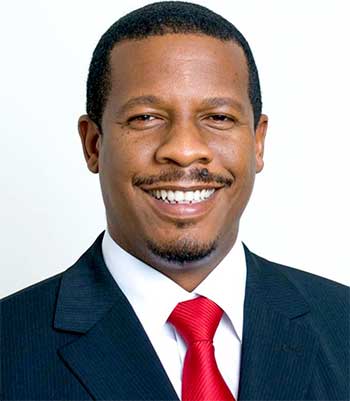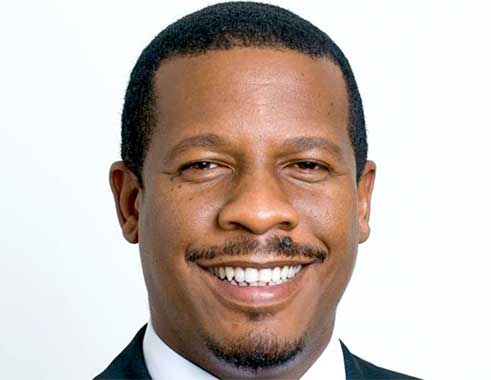
PEOPLE forget that the banking system is what lets the economy churn and operate. It allows investors to extract profits, businesses to pay suppliers, and fuels our tourism industry by supporting credit card transactions. Whilst we don’t see it or feel it, the banking sector is like the invisible hand that touches every single transaction. It’s not just about loans and deposits, it’s about facilitating trade and payments. We do that by utilising networks of correspondent banks that allow us to access international markets.
So any threat to the relationships that allow for foreign currency transactions in and out of Caribbean nations would be potentially devastating to the activities that fuel OECS island economies?
Johnathan J. Johannes: Imagine the worst case scenario. Your largest supermarket chain wants to import a forty-foot container of products from their supplier in Miami. There is no way for that company to receive a wire or a draft if there is no correspondent bank relationship to effect the payment. You would literally have to find a way of getting a duffle bag full of cash to the USA. By far, the hardest-hit jurisdiction thus far would have to be Belize. Think of it a ground zero for de-risking. There have been reports of businessmen resorting to shipping cold hard cash, actual bills, across borders to settle loans and transactions.
What is the underlying cause of de-risking?
Johnathan J. Johannes: Banks may choose to restrict or rationalise their correspondent banking relationships for a number of reasons. Guidance published by FATF in October 2016 cited supervisory penalties, changes in banks’ financial risk appetites and anti-money laundering (AML) compliance costs as key drivers of de-risking. Meanwhile, low interest rates have led to shrinking profit margins in correspondent banking, essentially leading some banks to welcome the opportunity to exit a line of business, which is now less lucrative than in the past. If I had to break it down to its simplest terms, high risk demands high reward. Maintaining relations is seen as a high risk for correspondent banks, a risk that is not matched by the reward.
Is it only about cost, or is there a reliability issue involved with the Caribbean banking sector?
Johnathan J. Johannes: That’s a good question. Is it down to cost or is it down to reputation? All I can say is that the majority of cases I have come across of institutions being fined because of their correspondent relationships do not have their origins in the Caribbean. There have been numerous examples in Central and South America and Eastern Europe, to name a few, but I have yet to come across a major international fine levied on a correspondent bank due to their relationships with Caribbean banks. So, in my opinion, it boils down to risk versus rewards cost and, unfortunately for us, the deck is against us.
As stated earlier, Belize is ground zero for Caribbean bank de-risking. If memory serves me correct, only two commercial banks maintain relations, one being Scotiabank. Think of the impact that can have on your tourism product, your mom and pop stores, remittances from relatives overseas. Thankfully, industry experts and partners have moved swiftly to seek alternative routes to continue engaging in US dollar transactions and have moved swiftly to open other channels.
Given what is at stake then, what is being done in real terms about the threat of de-risking? There is no doubt that there is a general awareness of the term among business commentators and economists, but how does the message filter down to the consumer?
Johnathan J. Johannes: I must applaud our CARICOM leaders and our regulator, the Eastern Caribbean Central Bank, because they continue to discuss it at almost every meeting they have. They have understood over time that it is not a crisis facing our banking sector, it is a crisis facing our Caribbean economies, and I believe that is the realisation our constituents arrive at.
What would help out tremendously is if people were more aware that this threat is looming, that we [the banks] are under such pressure. It links back to the need for a stronger compliance regime in the Caribbean. We have a very strong structure, hence the reason these fines are not being levied against the correspondent banks for transactions originating in Caribbean organisations. The regime is strong, our regulators are some of the best in the world, if you ask me, they guided us through the global crisis pretty much unscathed; we have robust regulations and procedures. These all bode well for our industry, our sector and our economies.
Often, customers complain “Why do you ask all these questions? Why do you want all this information now after I’ve been with the bank for twenty years?” And it speaks to a lack of knowledge on the customer’s part, no clear message from bank employees as to why we need “all this information”, and a general lack of sensitization to the issues related to de-risking. The international banks want to know who we do business with in order to take that risk of continuing a correspondent relationship. So they want us as Caribbean banks to have better information on our files about our customers.
Are customers in the Caribbean banking system being asked for more or different information than our international peers?
Johnathan J. Johannes: No, I don’t think so. Whenever I go to open a bank account, I have a standing joke that the amount of information I share with my banker is sometimes even more than I share with my wife! And I go through all this just to give you my money! As an insider, I sometimes get really frustrated and sometimes feel exposed responding to these questions — and I know and understand the reasons why I have to. Just imagine what it is like for our average customer, some who have described it as invasive and painful.
But as more people get to understand the regulations and the pressure the banks are under, plus the stress placed on the economy by a de-risking exercise, I believe they will be more understanding about the international standards that we have to comply with. In fact, small indigenous banks feel pressured to comply to a much higher standard than some of the larger organisations, because if we lose a correspondent relationship, it is a nail in the coffin of that institution.
Is there a Caribbean strategy for sustaining the pressure against de-risking? How do countries act through governments and NGOs to protect their economies?
Johnathan J. Johannes: The whole issue of de-risking has been raised at several CARICOM meetings, and the seriousness of the threat was outlined at the Heads of State meeting in Guyana in February 2017. That was the first time it was cemented that de-risking is a Caribbean problem. People say sometimes that all these leaders do is talk, what good ever comes from that? Well, in my opinion, the more they talk about it, the more they are educating their constituents who can then lobby to stave off the de-risking effort.
Saint Lucia’s Prime Minister Allen Chastanet has said correspondent banking wasn’t targeted towards the Caribbean but was aimed at eliminating money laundering and imposing huge penalties. He has reached the Florida Caribbean Cruise Association and pointed out the problems that cruise tourism will face if de-risking progresses towards catastrophic impact. These are the kind of stakeholders who can have influence in Washington because the effects on their business would be huge. They have a more powerful voice than our small island states have even collectively, and adding their voice to our lobbying effort will only serve to improve our odds.
At the institutional level, national level, CARICOM level, the Commonwealth level, we must all do what we can. For the Caribbean Bankers Association, it is a burning issue that we continue to address with international partner associations, and one that we do not see going away anytime soon unless we can change hearts and minds of the people who make the regulations.
This is clearly a major paradigm shift. What sort of innovative thinking is needed to develop the new reality for banking?
Johnathan J. Johannes: It all comes down to dollars and cents, so if I am the head of a global bank, I have to understand that having a relationship with the Caribbean is going to be profitable for me. And if we can find a way to make a relationship with the Caribbean more attractive, more profitable to the global banks, they will continue to do business with us. If the cost continues to outweigh the rewards, as with any business, you would have to re-examine the relationship. Simply put, we must sell our Caribbean banking system as safe, secure and profitable to international correspondent banks. That is the crossroads we find ourselves at.
In terms of “out-of-the-box” thinking, there are a lot of ideas floating around during discussions among bankers these days. We have to be thinking as a Caribbean entity, so how about a collaborative approach where the Caribbean banks and government give consideration to possibly buying or establishing a bank in the US system to act as our Corresponding Bank, handling all the region’s transactions. This is what makes the discussion exciting, because a paradigm shift always forces people to think outside the boundaries of today.
This is not business as usual, so challenging the status quo and coming up with innovative solutions will result from this change. I am confident that our Caribbean ingenuity will overcome this challenge, but the question is, will the goalposts shift again? ¤





![Simón Bolívar - Liberator of the Americas [Photo credit: Venezuelan Embassy]](https://thevoiceslu.com/wp-content/uploads/2025/12/Simon-Bolivar-feat-2-380x250.jpg)



